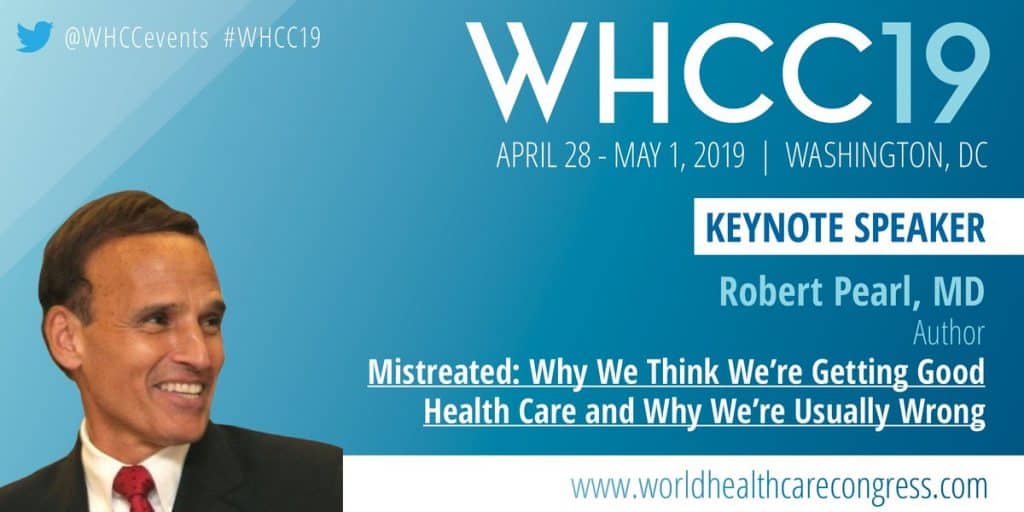Organized by executive director Megan Castilla and based in Washington, D.C., the event combines healthcare policy with cutting-edge innovation. With more than 300 top-notch speakers and 1,500+ attendees, the focus of everyone is on opportunities to raise quality while making care more affordable.
The program relies on a varied format, incorporating small group session, panels and major keynote addresses. I particularly enjoyed hearing Scott Gottlieb, recent head of the Food and Drug Administration (FDA), speak with sincerity and deep knowledge about the challenges of working in a national governmental leadership role, along with the agency’s successes.
On Monday, April 29, I had the opportunity to participate in a panel titled “Change the Game: Bypass Barriers to Drive Transparency and Affordability” alongside Lisa Suennen, Managing Partner at Venture Valkyrie LLC, and Martin VanTrieste, President and CEO of Civica Rx. Keynote moderator Marmi Jameson Carey, Executive Director of the Association of Independent Doctors, posed a series of questions about how the change process will happen in healthcare.
I pointed out that changing the game requires that we first understand what the current “game” is, and its rules.
When it comes to hospitals, drug companies and physician specialty organizations, the game is to gain market control, raise prices and hide outcome data. Many of these legacy players see information transparency as a threat to their bottom lines and aspirations for monopolistic control.
To change that, I offered a closer look at what needs to happen with each player in the game.
- Hospitals should be required to offer patients the total or “bundled cost” for procedures like total joint replacement and the birth of a child. This will allow patients to compare costs between hospitals and make an informed decision for themselves. To further boost transparency, hospitals should be required to display the following information in their lobbies for all to see: the annual rate of medical error and the frequency of hospital acquired infection. Hospitals must give both pieces of information to Medicare, why not hand it over to patients so they can make more informed decisions?
- Drug companies need to include the list price of their medications on all advertisements. And, when they do research, they should be required to compare the efficacy of new medications against those currently available, not just against placebo.
- Large specialty groups with excessive market control should be required to limit their prices to a number that’s comparable with other geographies, or face anti-trust actions.
Marni then asked how change would happen.
There are currently only two forces powerful enough to enforce change. The federal government and large purchasers like Amazon, Berkshire, JPMorgan Chase, which formed their own healthcare venture in 2018, led by Atul Gawande. The key will be integrating doctors for higher performance, moving from fee-for-service to capitation in order to maximize value, and implementing modern technologies such as video, data analytics and artificial intelligence.
In my closing remarks, I encouraged the audience to approach the future with a new mindset. Disruption doesn’t start quickly, but once it does, the pace accelerates rapidly. Those organizations that delay meaningful change will fall hardest. Just ask Kodak, Borders and Yellow Cab.
To the entrepreneurs in the audience, I suggested moving away from the innovation approaches of the past. Instead of starting with a cool technology and trying to wedge it into medical practice, begin with problems that both patients and doctors want solved.
To the businesses on hand, I urged them to find the courage to demand data transparency from the hospitals, doctors, and drug companies from whom they purchase. Refuse to contract with any of them that say “no.” Further, I asked them to make that information available to all employees.
To the elected officials looking on, I encouraged them to pass legislation that protects patients, rather than helping big healthcare companies achieve greater market control and higher prices without demonstrating added value.
Finally, I urged the physicians in the audience to change sooner than later. If not, they too will pay the price once disruption occurs.
I look forward to next year’s meeting. I’m confident it again will be outstanding.

* * *
Dr. Robert Pearl is the former CEO of The Permanente Medical Group, the nation’s largest physician group. He’s the bestselling author of “Mistreated: Why We Think We’re Getting Good Health Care–And Why We’re Usually Wrong” and a Stanford University professor. Follow him on Twitter @RobertPearlMD.






